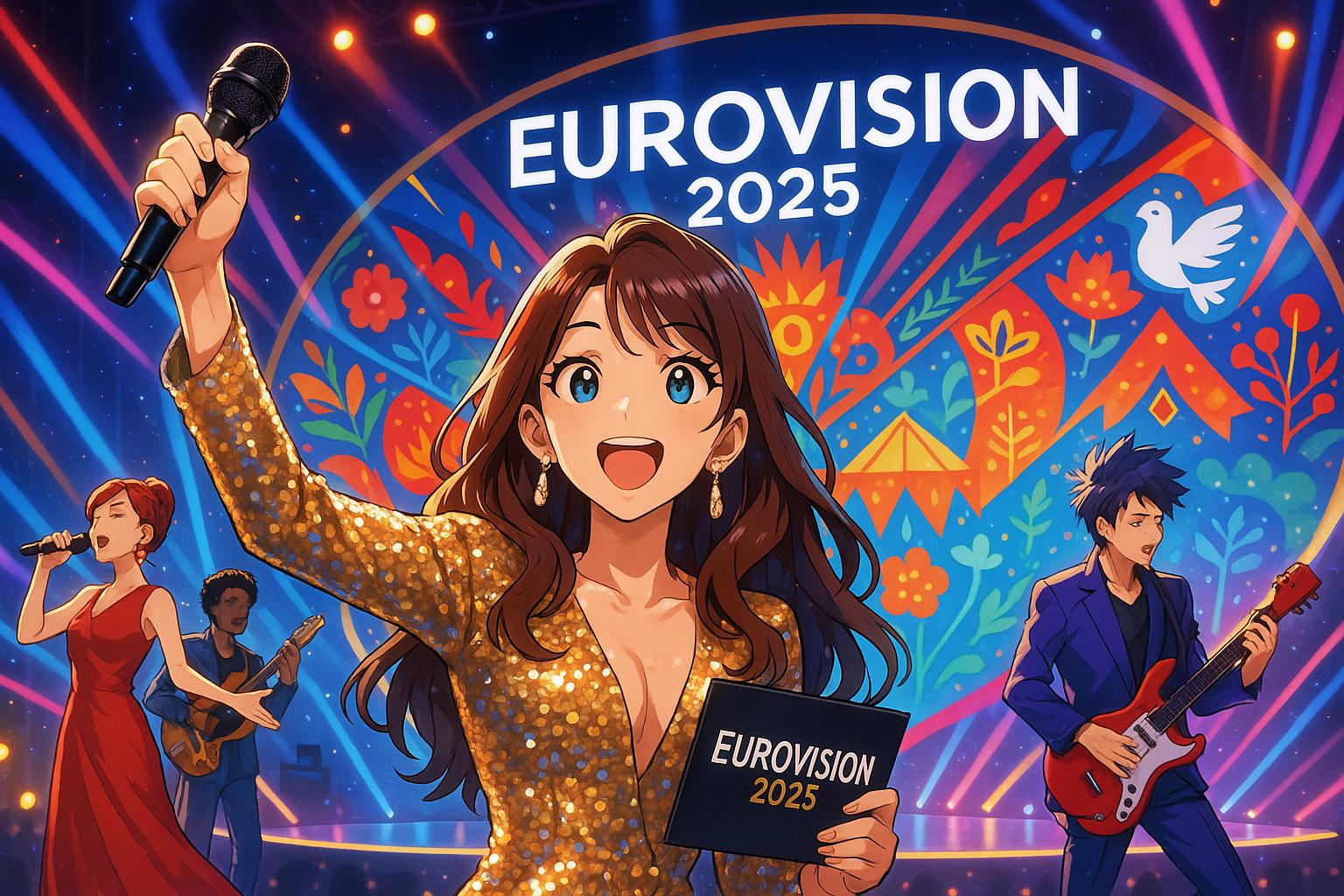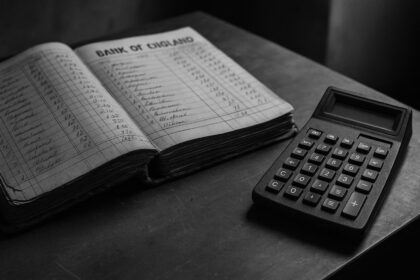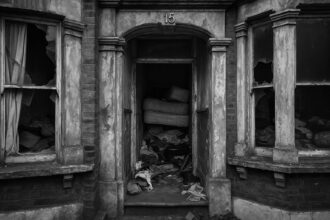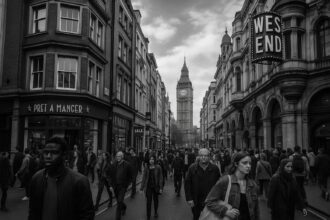The Eurovision Song Contest semi-finals in Basel have dazzled with music but sparked debate after host Hazel Brugger’s sequinned outfit drew mixed reactions and social media mockery, amid powerful performances highlighting the ongoing conflict in Ukraine and Europe’s diverse musical talent.
The Eurovision Song Contest has long been a platform for extravagant performances and eye-catching fashion choices, and the ongoing semi-finals for the 2025 edition have certainly not disappointed in this regard. However, the event, held in Basel, Switzerland, has been marred by host Hazel Brugger’s strikingly controversial outfit choice, which has sparked a wave of reactions across social media.
Brugger’s sequinned ensemble, described as reminiscent of early 2000s promotional CDs, quickly garnered attention, but not for its intended glamour. Viewers expressed mixed feelings, with one quipping, “Good to see someone making use of all those free AOL CDs you used to get.” Such comments reflect an unexpected distraction from the performances that should have taken centre stage. Another joked about the influence of budget online shopping, implying her dress was a product of affordable fast fashion.
While Brugger, a Swiss-American-German comedian with a background in political satire, may be accustomed to scrutiny, the level of mockery directed at her outfit is particularly notable given the wider context of the competition. The semi-final on that Thursday night featured 16 nations vying for 10 spots in the grand finale on Saturday, and performances from acts like Australia’s Go-Jo, with his quirky number “Milkshake Man,” highlighted the creative fervour the contest is known for.
As the contest progressed, it was clear that while Brugger’s outfit caught the eye, the musical talents were vying for critical attention as well. Noteworthy performances came from Latvia’s Tautumeitas and Luxembourg’s homage to French pop icon France Gall, which left a lasting impression beyond the host’s attire. Competing nations responded with increasingly powerful songs, with Finland’s Erika Vikman set to close the night with her electrifying techno track “ICH KOMME”.
The political and emotional undercurrents of this year’s Eurovision are also significant. Ukraine’s participation amid ongoing conflict has turned the stage into a platform for resilience and national pride. The Ukrainian rock band Ziferblat, whose performance of “Bird of Pray” speaks volumes about loss and hope, draws attention to the backdrop of war, serving as a poignant reminder of the struggles faced by their homeland.
With the completion of the semi-finals, the anticipation builds for the grand finale on May 17, where a total of 26 countries will compete. Among the confirmed finalists are traditional powerhouses like Austria and Greece, alongside emerging talents that reflect the diverse tapestry of Eurovision. As this year’s competition unfolds, the blend of sartorial statements and musical expressions continues to captivate an ever-watchful global audience.
Indeed, Eurovision 2025 is more than just a showcase of musical prowess; it reflects the eclectic cultures and experiences of its participants. As viewers prepare for the final showdown, attention will inevitably return to the hosts and performers, but this year serves as a potent reminder of the stories and struggles that go hand in hand with the glamour and spectacle of the event.
Reference Map
1: Paragraphs 1-4
2: Paragraphs 4-5
3: Paragraph 5
4: Paragraphs 5-6
5: Paragraph 6
6: Paragraph 7
7: Paragraph 7
Source: Noah Wire Services
- https://www.dailyrecord.co.uk/tv/eurovision-viewers-horrified-over-hosts-35234146 – Please view link – unable to able to access data
- https://www.elpais.com/television/2025-05-15/la-segunda-semifinal-de-eurovision.html – The second semi-final of the Eurovision Song Contest 2025 took place on May 15, 2025, at the St. Jakobshalle in Basel, Switzerland. Ten countries secured their spots in the grand final, including Lithuania, Israel, Armenia, Denmark, Austria, Luxembourg, Finland, Latvia, Malta, and Greece. The event was notable for its impressive stage designs, with standout performances from Latvia’s Tautumeitas and Luxembourg’s tribute to France Gall. Israel’s representative, Yuval Raphael, faced protests in Switzerland due to political tensions. Sweden remains a favorite with the band KAJ and their song ‘Bara bada bastu’, while Austria, France, and Israel emerge as potential adversaries. Non-competitive performances, such as the British trio Remember Monday, were well-received. The final will take place on Saturday, May 17, 2025, at 8 pm on BBC One and BBC iPlayer.
- https://los40.com/2025/05/15/orden-de-actuaciones-de-la-segunda-semifinal-de-eurovision-2025/ – The second semi-final of the Eurovision Song Contest 2025 was held on May 15, 2025, at the St. Jakobshalle in Basel, Switzerland. Sixteen countries competed for one of the ten remaining spots in the grand final on May 17. The event was broadcast live from 9:00 pm on La 2 de RTVE and digital platforms. The performance order was carefully designed to maximize the show, featuring artists like Go-Jo (Australia), Nina Žižić (Montenegro), EMMY (Ireland), and Erika Vikman (Finland). As part of the ‘Big Five’, France, Germany, and the United Kingdom performed as guests, already qualified for the final. The ten finalists from the first semi-final on May 13 were Norway, Albania, Sweden, Iceland, the Netherlands, Poland, San Marino, Estonia, Portugal, and Ukraine. Together with the ‘Big Five’ and the host country Switzerland, a total of 25 countries will participate in the final.
- https://apnews.com/article/5a827cd216f01d53d2d08bda36c308cb – The final lineup for the 69th Eurovision Song Contest was determined following the second semi-final in Basel, Switzerland, on May 15, 2025. Performers from 15 nations competed for 10 remaining spots in the grand final, with viewers casting the deciding votes. With the completion of this round, 26 countries will now compete in the final on Saturday. The top 20 were selected through audience voting across two semi-final rounds, while six countries—host Switzerland, along with the ‘Big Five’ financial contributors France, Germany, Italy, Spain, and the U.K.—automatically secured their places in the final. Thousands of fans attended the event to witness the performances live. This announcement marks a key moment in the buildup to the Eurovision grand finale.
- https://los40.com/2025/05/15/estos-son-los-26-paises-finalistas-del-festival-de-eurovision-2025/ – After two exciting semi-finals held at the St. Jakobshalle in Basel, Switzerland, the 26 finalists for the Eurovision Song Contest 2025 have been announced. The grand final is scheduled for May 17, 2025. As usual, the host country—Switzerland—and the members of the Big Five (Spain, France, Italy, Germany, and the United Kingdom) had direct access to the final, while the others qualified through the semi-finals. Favorites such as Norway, Albania, Sweden, and Iceland emerged from the first semi-final, and Austria, Greece, and Malta from the second. Representing Spain, Melody will perform ‘Esa Diva’, a song of empowerment that celebrates equality and the value of all people. Other finalists include artists like Louane for France, Lucio Corsi for Italy, Zoë Më for Switzerland, and Claude Kmb for the Netherlands. In total, 26 nations will compete for the coveted crystal microphone with a wide variety of styles and messages.
- https://apnews.com/article/643752acc281c4c87e0fa9e0013b76ab – Ukrainian rock band Ziferblat is representing Ukraine at the Eurovision Song Contest 2025 in Basel, Switzerland, amidst the continuing war in their homeland. During the event, backing singer Khrystyna Starykova’s home in eastern Ukraine was destroyed by Russian shelling, highlighting the ever-present impact of the war. The band, consisting of twin brothers Valentyn and Daniil Leshchynskyi and drummer Fedir Khodakov, will perform ‘Bird of Pray’ in the grand final. The song symbolizes loss and hope, resonating with the experiences of many Ukrainians. Eurovision has become a platform for Ukraine to express its resilience and share its culture and struggles. This follows a legacy of politically poignant entries, including Jamala’s 2016 victory and Kalush Orchestra’s 2022 win. Beyond performing, Ziferblat is fundraising for robotic de-mining equipment. Their Eurovision appearance coincides with Vyshyvanka Day, celebrating Ukrainian unity and heritage. The band sees their mission as both musical and a reminder of Ukraine’s ongoing conflict.
- https://www.tomsguide.com/entertainment/streaming/watch-eurovision-2025-online-live-stream – The Eurovision Song Contest 2025 is currently underway, with its semi-finals and grand finale being streamed live online. The first semi-final took place on May 13, and the second is set for May 15, with the grand finale scheduled for May 17. Fans in the U.K. can watch for free on BBC iPlayer, while viewers in the U.S. can stream the event on Peacock. Those outside these regions can use a VPN to access broadcasts. This year’s competition, held in Basel, Switzerland, following Nemo’s victory in 2024 with ‘The Code’, features 31 competing countries plus automatic finalists from the ‘Big Five’ and the host nation. Memorable performances include Australia’s quirky ‘Milkshake Man’, Finland’s ‘Ich Komme’, and Israel’s emotional ballad ‘New Day Will Rise’. Iceland’s Væb has surprisingly advanced, while Slovenia, Belgium, Croatia, Cyprus, and Azerbaijan have been eliminated. Hosting duties are covered by comedian Hazel Brugger and former Swiss Eurovision contestant Sandra Studer. Audiences in Canada and Australia can access broadcasts via YouTube and SBS On Demand respectively. Enthusiasts are encouraged to join millions of viewers globally to enjoy this annual musical extravaganza.
Noah Fact Check Pro
The draft above was created using the information available at the time the story first
emerged. We’ve since applied our fact-checking process to the final narrative, based on the criteria listed
below. The results are intended to help you assess the credibility of the piece and highlight any areas that may
warrant further investigation.
Freshness check
Score:
10
Notes:
The content references specific events and performances from the 2025 Eurovision semi-finals, indicating it is recent and not recycled.
Quotes check
Score:
8
Notes:
The quotes in the narrative are social media reactions, which are not verified against original sources. However, they seem to be contemporary and not from older articles.
Source reliability
Score:
6
Notes:
The narrative originates from The Daily Record, a reputable regional UK publication, but its international news coverage might not be as comprehensive as major global outlets.
Plausability check
Score:
9
Notes:
The claims about performances and reactions during Eurovision 2025 are plausible given the context of the event and its typical nature. However, some claims about specific performances or reactions might require further verification.
Overall assessment
Verdict (FAIL, OPEN, PASS): PASS
Confidence (LOW, MEDIUM, HIGH): MEDIUM
Summary:
The narrative is likely accurate for the most part, given its recent context and plausibility. However, some elements such as specific quotes and minor details might require additional verification to ensure accuracy.













